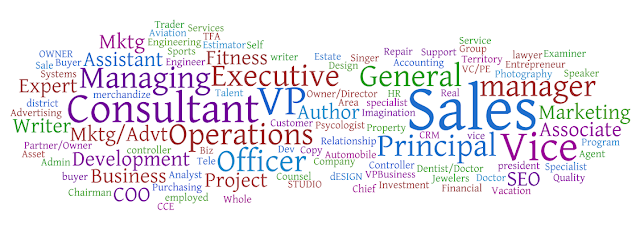Sales Professional—Really?
Let’s start out with the premise you are
actively engaged in selling. Your card
may carry a slightly different title. It
seems like nobody has a card with the title “Sales Professional.” Instead, you could be listed as any one of
the following:
- Sales Engineer
- Field Engineer
- Account Manager
- Account Executive
- Product Specialist
- Customer Service Resource
- Branch Manager
- Inside Sales
- Channel Manager
- Customer Omnibus Person
- Business Development
But somewhere in the details of your job
description, you are measured on your ability to grow the number of purchases made by customers under your direction.
This makes you a Sales Professional.
This makes you a Sales Professional.
As a professional, you have the intrinsic
responsibility to perform better than someone who is a selling amateur.
With this fact in mind, we must ask the
question: “What are you doing to improve your professional skills?"
We ask this question often and the answers
are shocking. Most salespeople immediately
refer to product-based training and their propensity to study catalogs. But when we refocus the question back on to
the actual art and science of selling, they stammer.
A few reach way back to a day-long session
they attended years ago. Some will even
argue that their selling is entirely derived from their product skills and
insist their customers don’t respond to “cheap” selling tactics.
Allow me to point out our kind of selling
is different from the approaches used by those hawking aluminum siding, cell
phones or water beds. This alleviates
the need for sleaze
ball old school techniques once touted by self-proclaimed
selling gurus. Things like the “four
wall close” and the “yes, yes, yes close” taught during the 1970s no longer
work in our business; assuming they ever did.
But there are best practices worth exploring.
Well-developed questions identified ahead
of a sales call pay dividends.
Assembling account data (things like products produced, processes
employed, cost drivers and known production issues) is even more important
today than ever. Understanding the
competition and their perceived importance to the customer is critical. Targeting of customers is a later day must
do. We could go on for hours but suffice
it to say, there are important skills to improve.
The question for sellers becomes “where do
you get information on improving?” I
believe it rarely comes via our own intellect.
One need only look to other professions employing smart people for proof
of this concept.
Doctors are required to read medical
journals and attend conferences for their chosen field of medicine. My friend is a high end commercial Real
Estate Appraiser who must attend hours of continuing education each year. Certified Financial Planners, college
professors, lawyers and many other “professionals” participate in ongoing
training.
I believe ongoing sales skill training “trumps”
a day-long event. Whether good or bad,
the nature of today’s world has conditioned most of us to learn in shorter
duration events, a few minutes (maybe an hour) of new thoughts loaded into our
mind does more to allow us to ponder and implement new ideas.
Never before has there been such a
plethora of information available to those in our profession. Amazon offers up thousands of books aimed
specifically at our industry. (I
personally recommend Dave Kahle’s How to Excel in Distributor Sales to anyone
who will listen.) There are tons of
distributor specific selling ideas available in distributor trade
publications. And, lest I forget to include
a totally self-serving plug, this blog and others like it have massive content.
Don’t like to read? There are plenty of videos on YouTube and
podcasts to keep you busy. Why not use
some of your windshield time to “load your mind” with great ideas?
Now back the question I always ask… “What
are you doing to improve your professional skills?”
And a question for our readers…
Do you feel you would benefit if this
information was available in podcast format?
Drop us a line with your opinion!







Comments